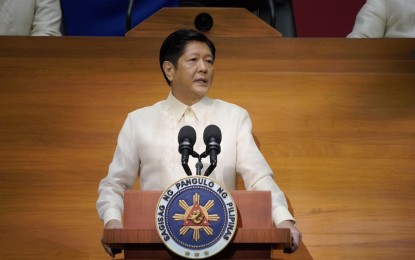
President Ferdinand Marcos Jr.
#PBBMSONA2022
MANILA – Building new power plants, the use of renewable energy and bringing down the price of electricity to consumers are the priorities of President Ferdinand Marcos Jr. in the next six years of his administration.
“At present, our demand for energy far exceeds our reliable supply.
We must increase the level of energy production. We must look at every possible option that would be appropriate for the Philippine situation,” Marcos said in his first State-of-the-Nation Address on Monday.
“We must build new power plants. We must take advantage of all the best technology that are now available, especially in the area of renewable energy,” he said.
The President said there is a need to examine the entire system of transmission and distribution for the purpose of finding ways to lower the price of energy to the consuming public.
“We will involve our cooperatives. Their transmission efficiencies, and our traditional distribution system must be more effective in bringing power cheaply to both our homes and industries,” he said.
In his SONA, Marcos reiterated his earlier position that it is time to re-examine the government’s strategy towards building nuclear power plants in the Philippines.
“In the area of nuclear power, there have been new technologies developed that allow smaller scale modular nuclear plants and other derivations thereof,” the President said.
“We will comply, of course, with the International Atomic Energy Agency (IAEA) regulations for nuclear power plants as they have been strengthened after Fukushima,” he said.
The President maintained that the search for new power sources should always be with an eye to improving the energy mix supply between traditional and renewable sources.
“The technology on renewable energy is progressing rapidly. And many of these technologies are appropriate for the Philippines. We have already begun windmill power, and we are now expanding very quickly our solar power production,” Marcos pointed out.
For wind turbines, the World Bank has calculated this to have the potential for 280-gigawatts by 2030.
“Solar power has steadily increased its efficiency in converting sunlight to electrical power, which is particularly attractive to us. Unlike wind power, solar power is practical — almost everywhere in the Philippines all year round,” Marcos said.
“In the move to lowering our carbon footprint caused by energy production, our advancement to renewables will have a lead time,” he added.
Marcos pointed out that in the interim, natural gas will hold the key. “We will provide investment incentives by clarifying the uncertain policy in upstream gas, particularly in the area close to Malampaya,” he said.
This, he said, requires clarification of the process and review of service contracts policy.
Another fundamental requirement for growth and increased employment will be the availability of cheap, reliable energy, the President said.
“This even comes under the category of ‘ease of doing business’ if we are to attract investors, both local and foreign, to set up shop here in the Philippines,” he added.
The President said there is still room to expand the country’s present power supply through the existing power sources, but only to a limited extent.
Marcos said Public-Private Partnership will play a part in support as funding in this period is quite limited. (PNA)
